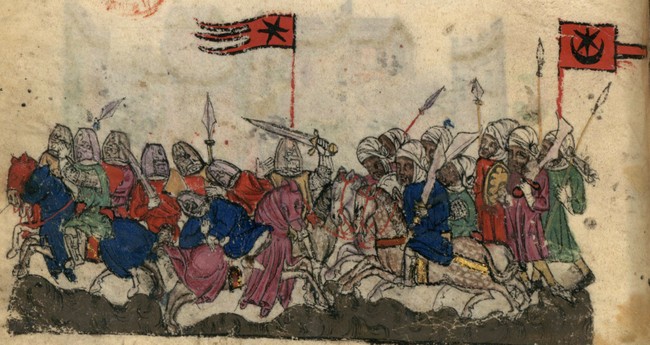The Christian commander began by diplomatically blaming Arabia’s harsh conditions and impoverished economy for giving the Arabs no choice but to raid Roman lands. Accordingly, the empire was pleased to provide them with food and coin on condition that they return home. “It was not hunger that brought us here,” Khalid responded coolly, “but we Arabs are in the habit of drinking blood, and we are told the blood of the Romans is the sweetest of its kind, so we came to shed your blood and drink it.
Vahan’s diplomatic mask instantly dropped and he launched into a tirade against the insolent Arab: “So, we thought you came seeking what your brethren always sought” — plunder, extortion, or mercenary work. “But, alas, we were wrong. You came killing men, enslaving women, plundering wealth, destroying buildings, and seeking to drive us from our own lands.” Better people had tried to do the same but always ended up defeated, added Vahan in reference to the recent Persian Wars, before continuing:
The Sword of Allah was not impressed. He began reciting the Koran and talking about one “Prophet Muhammad.” Vahan listened in quiet exasperation. Khalid proceeded to call on the Christian general to proclaim the shahada — that “there is no god but Allah and Muhammad is his messenger” — and thereby embrace Islam, in exchange for peace, adding, “You must also pray, pay zakat, perform hajj at the sacred house [in Mecca], wage jihad against those who refuse Allah, … and befriend those who befriend Allah and oppose those who oppose Allah,” a reference to the divisive doctrine of al-wala’ wa al-bara’. “If you refuse, there can only be war between us… And you will face men who love death as you love life.”
“Do what you like,” responded Vahan. “We will never forsake our [Christian] religion or pay you jizya.” Negotiations were over.
Things came to a head, quite literally, when 8,000 marching Muslims appeared before the Roman camp carrying the severed heads of 4,000 Christians atop their spears. These were the remains of 5,000 reinforcements who had come from Amman to join the Roman army at Yarmuk. The Muslims had ambushed and slaughtered them. Then, as resounding cries of “Allahu akbar” filled the Muslim camp, those Muslims standing behind the remaining 1,000 Christian captives shoved them down and proceeded to carve off their heads before the eyes of their co-religionists, whom Arabic sources describe as looking on in “utter bewilderment.”
Vahan’s diplomatic mask instantly dropped and he launched into a tirade against the insolent Arab: “So, we thought you came seeking what your brethren always sought” — plunder, extortion, or mercenary work. “But, alas, we were wrong. You came killing men, enslaving women, plundering wealth, destroying buildings, and seeking to drive us from our own lands.” Better people had tried to do the same but always ended up defeated, added Vahan in reference to the recent Persian Wars, before continuing:
As for you, there is no lower and more despicable people — wretched, impoverished Bedouins. . . . You commit injustices in your own nation and now ours. . . . What havoc you have created! You ride horses not your own and wear clothes not your own. You pleasure yourselves with the young white girls of Rome and enslave them. You eat food not your own, and fill your hands with gold, silver, and valuable goods [not your own]. Now we find you with all our possessions and the plunder you took from our coreligionists — and we leave it all to you, neither asking for its return nor rebuking you. All we ask is that you leave our lands. But if you refuse, we will annihilate you!
The Sword of Allah was not impressed. He began reciting the Koran and talking about one “Prophet Muhammad.” Vahan listened in quiet exasperation. Khalid proceeded to call on the Christian general to proclaim the shahada — that “there is no god but Allah and Muhammad is his messenger” — and thereby embrace Islam, in exchange for peace, adding, “You must also pray, pay zakat, perform hajj at the sacred house [in Mecca], wage jihad against those who refuse Allah, … and befriend those who befriend Allah and oppose those who oppose Allah,” a reference to the divisive doctrine of al-wala’ wa al-bara’. “If you refuse, there can only be war between us… And you will face men who love death as you love life.”
“Do what you like,” responded Vahan. “We will never forsake our [Christian] religion or pay you jizya.” Negotiations were over.
Things came to a head, quite literally, when 8,000 marching Muslims appeared before the Roman camp carrying the severed heads of 4,000 Christians atop their spears. These were the remains of 5,000 reinforcements who had come from Amman to join the Roman army at Yarmuk. The Muslims had ambushed and slaughtered them. Then, as resounding cries of “Allahu akbar” filled the Muslim camp, those Muslims standing behind the remaining 1,000 Christian captives shoved them down and proceeded to carve off their heads before the eyes of their co-religionists, whom Arabic sources describe as looking on in “utter bewilderment.”

